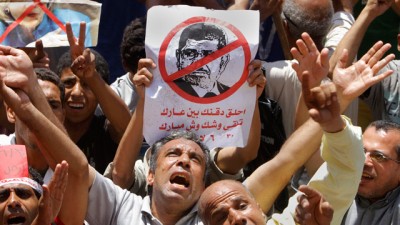Egypt at a Crossroads: From Revolution to Military Coup?

Two and a half years after the Egytian uprising, the country is at a simultaneously perilous and exciting crossroads. The situation is immediately perilous because it appears that Egypt’s options for the immediate future are either a continuation of the quintessentially flawed governance by the Muslim Brotherhood or a military coup that would return the Mubarak era (and US-inclined) military to power. At the same time, the revolutionary fervour of the people is inspiring and optimistic. These are not the Egyptians of years past. While their initial revolution may have been co-opted (as evidenced by the rise to power of Morsi and the Brotherhood), that uprising awakened something in them that cannot be put down – an urgency and a defiance that will not stop, that will continue to pour out into the streets by the tens of millions, until their grievances are properly addressed and the country is transformed and governed to serve their needs.
The Morsi government does not serve the Egyptian people, which is no surprise. Morsi and the Brotherhood were not directly involved in the initial revolution of 2011. They waited in the wings and then high jacked the outcome. So let it be stressed that they are not the result of the revolution. Their principles and their post-revolution policies and practices are antithetical to any authentic revolutionary change in the service of the Egyptian people.
All efforts of the Brotherhood to divert attention to issues of religion notwithstanding, the main issues plaguing the Egyptian people internally are economic (i.e., unemployment, poverty) and politico-economic. And externally, Egypt has to begin to address the military and political stranglehold imposed upon it for decades by the US and Israel and their interests in the region.
Rather than effectively address real and pressing matters, Morsi has been creating and exasperating so-called religious and sectarian cleavages, while resurrecting centuries old (and diversionary) retrograde religious debates that have nothing to do with the current realities, grievances and desires of the Egyptian people. His government has refused to work in cooperation with other groups within the country. The Brotherhood has excluded other opposition movements and concentrated authority in its hands, filling several top government posts with its own members [1].
At the same time, the Brotherhood has assured western powers of its commitment to free-market capitalism [2] and is negotiating IMF loans. IMF loans always come with heavy conditions, known as structural adjustment programs (SAPs), which are ultimately bad for the local economy and people but prosperous for foreign interests and “investors.”
SAPs open up domestic markets to Western “direct investment” and privatization. This will ultimately serve to further enrich Western multinational corporations and private industries, while limiting access to much-needed public services (through privatization).
Overall, the Brotherhood is bad for Egypt and it will be great if they are made to step down. However, a military coup that sees many Mubarak-era, US-backed generals and military leaders hold power is also bad for the county and its people. Egypt is between a political rock and a hard place. While a military coup may sound like a “solution” compared to a Morsi government, that is not what Egypt needs for the long run. Military rule will bring Egypt back to where it was after the election when the military, under Tantawi, refused to hand power over to an interim civilian authority. Moreover, through the military, the US may eventually be able to ensure another puppet regime that does not serve the interests of the Egyptian people.
For western powers, it ultimately does not matter who rules Egypt—secular or Islamist—as long as the leadership allies with their economic and geo-political interests and agendas. It is likely that powerful western states were willing and happy to back an acquiescent Morsi government but are now waiting to see which way the popular winds will blow. If Morsi steps down or is forced out in the coming hours or days, then it is likely that the US and Israel will eventually attempt to influence the policies and direction of the nation through the military, and beyond.
In the face of this, Egypt needs a truly revolutionary, grass roots opposition; it requires a coalition of oppositional forces that can band together to address Egypt’s internal issues while avoiding the pitfalls of being Israel’s largest neighbour. What Egypt needs is an oppositional force that is truly revolutionary, is concerned with the poor, unemployed and the working class and is not beholden to, or a puppet of, western powers. Getting there will be no easy task but the people of Egypt have demonstrated and continue to demonstrate an unwillingness to go backwards. That is something to celebrate even if the immediate future is somewhat perilous.
Ghada Chehade is an independent political analyst, poet, and activist. She holds a PhD from McGill University www.ghadachehade.com
Notes
[1] http://www.uruknet.info/?p=m98786&hd=&size=1&l=e
[2] http://www.opendemocracy.net/fawaz-gerges/new-capitalists- islamists-political-economy

